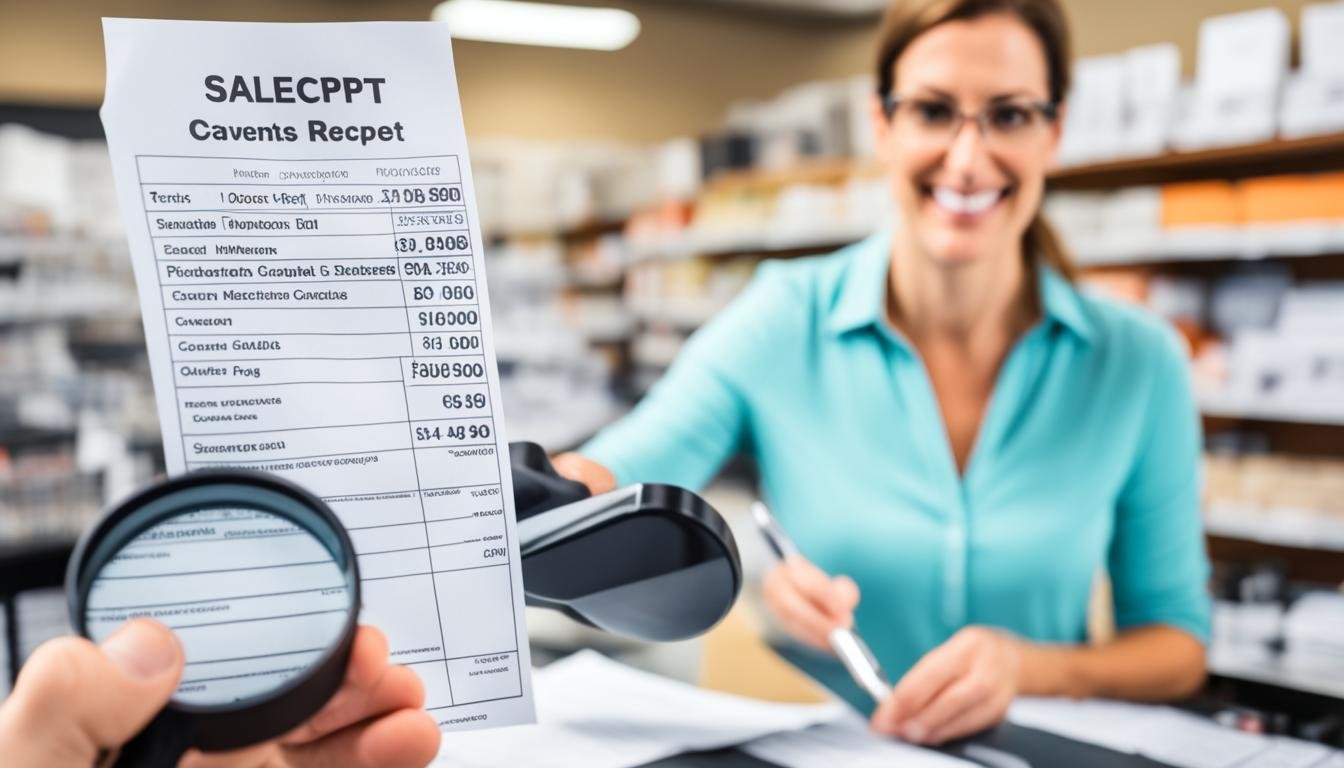Sales Tax Demystified for SMEs
Small businesses in the US collect and pay over $165 billion in sales tax yearly. It’s key for small and medium-sized enterprise (SME) owners to know sales tax rules. Not following these can lead to fines and legal trouble that seriously harm their businesses.
Our guide will clear up sales tax confusion for SMEs. We’ll talk about everything you need to understand – from when sales tax applies to what products get taxed. You’ll learn how to keep up with sales tax as a small business.
Key Takeaways:
- Understanding sales tax regulations is crucial for small business owners.
- Small businesses in the US collectively collect and remit over $165 billion in sales tax annually.
- Non-compliance with sales tax regulations can result in penalties and legal repercussions.
- This guide will cover topics such as when to charge sales tax, determining nexus, product taxability, and remitting sales tax.
- By understanding sales tax regulations and complying with them, SMEs can ensure legal compliance and avoid unnecessary financial risks.
When to Charge Sales Tax
It’s crucial for small business owners to know when they should charge sales tax. In the United States, forty-five states plus many local areas need businesses to collect sales tax. But, there might be exceptions based on where sales happen, the product, and the location.
Small business owners must learn what their state or local area asks for a sales tax permit. This is key to following the law and avoiding fines. It’s vital to charge the correct local and state tax rates for each sale. Also, any special rates must be applied.
Being up-to-date on sales tax rules helps SME owners handle it confidently. They can then manage sales tax smoothly, knowing what’s needed for their business.
“Understanding when to charge sales tax can feel complicated, but it’s crucial for business owners. Staying on top of sales tax laws helps avoid legal troubles and keeps a good business image.”
Understanding Nexus
For small businesses, nexus is crucial for determining their connection to a state regarding sales tax. Knowing if your business has nexus in states where you work is very important. This helps you follow sales tax laws.
Nexus can differ from state to state. It might be based on if you have a store there, your sales, or other activities. It’s key to be informed about these rules. This way, you can manage sales tax compliance well.
If your business has a real spot in a state, like a store or office, you have a physical presence nexus. On the flip side, economic nexus relates to your sales in a state, even if you lack a physical presence there.
For instance, going over a certain sales limit in a state through your online business might mean you have to pay sales tax there. This is true even if your business is not physically in that state.
Moreover, some states make online platforms handle sales tax for their sellers. Knowing these marketplace facilitator laws can help make your tax duties easier.
Note:
Always talk to a tax pro or check with state tax agencies for the right advice. This is to make sure you get nexus rules correct in the states where you do business.
Grasping the concept of nexus can help simplify SME sales tax and ensure small business tax compliance. Knowing where you have nexus can help you meet your sales tax duties. This can keep you out of trouble and away from fines or legal problems.
Product Taxability
Small business owners need to understand product tax to follow sales tax laws correctly. Tax rules change by location and what kind of product you’re selling. It’s important to know these aspects to meet sales tax rules.
One big question is if the tax is based on where the product is from or where it’s sold. Some areas use where the product is sold to set tax (destination-based). Others use where it’s from (origin-based). Business owners must learn their state’s rules to charge and collect the correct tax.
Knowing if you’re selling a product or a service matters a lot for tax rules. While most places add tax on products, services might not be taxed or have a different rate. Business owners need to check their state’s rules to make sure they’re taxing products or services right.
“Understanding the taxability of products is crucial for small business owners to ensure compliance with sales tax regulations.” – John Smith, Small Business Owner
Some products or services might have special tax rules. For instance, some places don’t tax food or medicine. Others might tax luxury items or tobacco more. Business owners must look into these special rules to collect and pay the right tax.
In short, grasping product tax rules is key for business owners dealing with sales tax. It’s not just about the product’s nature; it’s also about where and how it’s sold. By understanding the various aspects, businesses can avoid problems with taxes.
Key Points:
- Product taxability varies depending on jurisdiction and the type of product being sold
- Consider whether sales tax is origin-based or destination-based
- Distinguish between products and services in terms of taxability
- Be aware of specific tax requirements for certain goods or services
Resale Certificates
Resale certificates are key for businesses that sell products meant for resale. If you’re in wholesale, or manufacturing, knowing about resale certificates is vital for your business.
A resale certificate lets the seller skip charging sales tax on resale items. It shows that the buyer plans to sell the items they purchase. This means the sales tax burden shifts to the final consumer.
Remember, only give out resale certificates for items intended for resale. If a customer is buying something for personal use, apply sales tax as usual.
Each state offers info on resale certificates online. Make sure you know your state’s rules to manage sales taxes well. This can help your small business follow the right steps.
If you’re unsure about resale certificates, talking to a tax expert is wise. They can give you precise advice. Or, you could contact your state’s Department of Revenue. They are there to guide you on this important tax matter.
Sales Tax Obligations for LLCs
LLCs must deal with sales tax when they sell things in certain areas. It’s key for LLC owners to know and follow these rules. This stops problems and fines.
Factors to Consider
There are several things you should think about for your sales tax as an LLC:
- SME Sales Tax Simplified: Learn the sales tax basics for SME owners to do the right thing.
- Sales Tax Basics for SME Owners: Get to know the main ideas of sales tax.
- Nexus: Figure out if your business is linked to a state for tax reasons.
- Product Taxability: Know if the things or services you sell are taxed, as this varies by place and item.
- Resale Certificates: If you sell items for resale, make sure you get the right certificates from buyers.
Thinking about these points makes handling your sales tax easier. This keeps you in line with the state laws.
Here’s a simple table to help with your LLC’s sales tax duties:
| Factors | Description |
|---|---|
| SME Sales Tax Simplified | Learn the facts about sales tax for small business owners |
| Sales Tax Basics for SME Owners | Get familiar with the core sales tax ideas |
| Nexus | Find out if your LLC is tied to a state for tax reasons |
| Product Taxability | Know if your sales items or services are taxable |
| Resale Certificates | Make sure you gather the right resale certificates if you sell for resale |
Addressing your sales tax duties well is important for your LLC. It means following the rules, keeps your customers happy, and helps your business run smoothly.
Remitting Sales Tax
Small business owners are key players in their communities. It’s essential they know how to handle sales tax. This keeps their business running smoothly. When they collect sales tax, there are key steps they must follow.
First off, they need to register with their state’s tax office. Every state has its own registration rules. Business owners should check what their state requires. Usually, they fill out some forms and share business info.
After registering, keeping track of the sales tax they collect is very important. They should make sure this is shown on their invoices. This proof will make filing their taxes accurate and easy.
Next, filing tax returns on time is crucial. Owners must know their state’s deadlines. They could be monthly, quarterly, or yearly. It’s critical to stick to these deadlines to avoid extra fees.
When the tax returns are filed, the next step is to pay the sales tax. They should follow the state’s guidelines on how to do this. Payments can be online or by mail. Being on time and accurate with these payments is vital.
For small business owners, knowing how to deal with sales tax is vital. By doing simple tasks like registering properly, keeping good records, filing on time, and paying promptly, they can manage their taxes well. This lets them focus on growing their business, worry-free.
Common Compliance Pitfalls
Not following sales tax rules can hurt small businesses. Knowing and avoiding common mistakes is key for success. This helps when dealing with sales tax.
Falling Behind on Legislative Updates
It’s vital to keep up with sales tax laws. Not doing so can mean making mistakes on taxes or reports. By often looking at sales tax rules, businesses can stay out of trouble and tax correctly.
Difficulty in Breaking Down Tax Rates
Places have different sales tax rates. It can be hard to know the right rate for each place. Using special tax software or getting help from a pro can make this task easier. It helps businesses avoid issues with tax rates.
Neglecting to Collect Tax Where There is Nexus
Nexus is the link between a business and a state, needing collection of sales tax. Missing the tax in these states leads to penalties. Businesses need to know about nexus and tax everywhere they should.
Failing to Collect Exemption Certificates on Exempt Sales
For tax-free sales, exemption certificates are a must. Not getting these from customers can lead to wrong tax charges. Setting up a way to get and check these certificates is important for correct tax handling.
“Not keeping up with sales tax laws can be very damaging for small businesses. By keeping up with law changes, making sure tax rates are correct, understanding nexus rules, and collecting correct exemption certificates, businesses can avoid many problems. This leads to better handling of sales tax.”– Jane Smith, Tax Consultant
Managing Sales Tax Questions
Being a small business owner means answering sales tax questions well. It’s key for staying compliant and avoiding risks. Dealing with sales tax can be tough, but the right tools make it easier.
A top-notch sales tax solution, such as SME Sales Tax Made Easy, is a great help. It gathers key info for you, like tax rates and due dates, all in one spot. Instead of searching for hours, you find what you need fast.
By using a sales tax tool, you can:
- Quickly see the right tax rates for your stuff
- Learn what items are taxable
- Keep up with tax law changes
- Be on time with tax filings
A platform for all your sales tax needs keeps you on top of things and cuts down mistakes. It makes life simpler, letting you focus on making your business better, not on tax details.
“A comprehensive sales tax solution simplifies sales tax compliance, providing small business owners with the essential information they need in one convenient place.”
How to Navigate Sales Tax for Small Enterprises is a guiding light for owners. It’s easy to use, with info for all your sales tax queries. It helps you take charge of your sales tax duties.
Choosing the right sales tax tool helps you handle it all with ease. It lets you comply smoothly, so you can concentrate on growing your business!
Understanding Use Tax
Use tax is a tax on items used, consumed, distributed, or stored in a state. It applies mostly to items bought from out-of-state or online. This is to make sure taxes are paid, helping avoid tax dodges.
Small businesses need to know their local rules and tax rates. It’s important to report and pay use tax correctly. Doing this avoids fines and ensures the right tax on what you buy.
Key Points about Use Tax:
- Applicability: Any tangible personal property or taxable service purchased for business use may be subject to use tax if sales tax has not been paid on the purchase.
- Differentiation from Sales Tax: Use tax differs from sales tax because buyers pay it directly. This task of keeping track and paying is up to the buyer, even if it’s a small business.
- Reporting and Compliance: Small businesses must track and report their use tax well. How you report and pay depends on the rules where you are.
- State-Specific Regulations: Every state has its own use tax laws. To keep in line with these regulations, know the rules for each state you operate in.
Tip: Keeping good records of what you buy is key. This includes receipts and other purchase proof. It helps with taxes and audits later on.
Example Use Tax Rates by State:
| State | Use Tax Rate |
|---|---|
| California | 7.25% |
| Texas | 6.25% |
| New York | 4% |
| Florida | 6% |
| Illinois | 6.25% |
Tax rates for use tax change from state to state. They might be the same as sales tax or not. Small businesses should talk to tax experts or check with their state’s tax office to get the right rates for their situation.
Knowing about use tax and following the rules is key for small businesses. Keeping accurate records, checking state laws, and getting help when needed makes handling use tax easier.
State Income Tax Requirements for Small Businesses
Understanding sales tax is key for small businesses. But, they must also know about state income tax. In Georgia, filing income taxes depends on business factors like type and number of employees.
The Georgia Department of Revenue explains state tax rules for small businesses. Small business owners must acquire the right info and forms for their state income tax returns.
Understanding State Income Tax Obligations
Tax needs for small businesses change based on their setup and location. This affects the tax they pay.
Business owners in Georgia should get advice from the Georgia Department of Revenue or a tax pro. They need to keep clear financial records to file taxes correctly.
Determining Filing Frequency and Deadlines
State tax file deadlines differ. In Georgia, most small businesses file once a year. But some situations call for more or different filings.
Knowing Georgia’s tax deadlines is critical to avoid penalties. Filing on time keeps your business’s finances in order.
Seeking Professional Assistance
State tax needs can be tough for small business owners to figure out. A tax expert or accountant can help a lot. They give insights and support in meeting tax duties.
Getting professional help lets small businesses concentrate on their work. It ensures they meet state tax demands without stress.
Conclusion
Business owners play an essential role in sales tax. They need to know when to charge sales tax and more. This knowledge helps them follow state rules.
Understanding sales tax basics is crucial for small businesses. Tips and guides like a small business sales tax tips and a sales tax guide for small businesses can be very helpful.
It’s important to take control of your business’s sales tax plan. Keep up with new laws, use good sales tax tools, and ask for help when needed. Doing these things, you can smoothly handle your sales tax.







